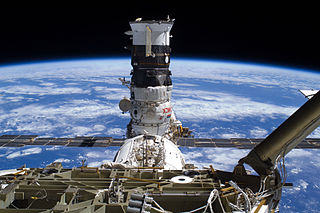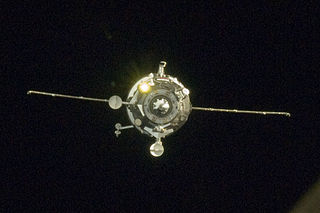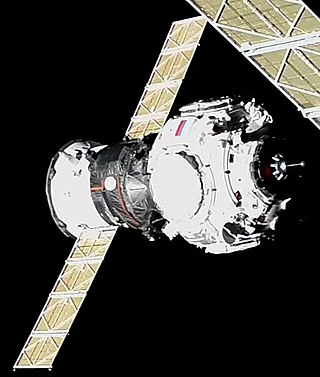
The Progress is a Russian expendable cargo spacecraft. Its purpose is to deliver the supplies needed to sustain a human presence in orbit. While it does not carry a crew, it can be boarded by astronauts when docked to a space station, hence it is classified as crewed by its manufacturer. Progress is derived from the crewed Soyuz spacecraft and launches on the same launch vehicle, a Soyuz rocket.

PAO S. P. Korolev Rocket and Space Corporation Energia, also known as RSC Energia, is a Russian manufacturer of spacecraft and space station components. The company is the prime developer and contractor of the Russian crewed spaceflight program; it also owns a majority of Sea Launch. Its name is derived from Sergei Korolev, the first chief of its design bureau, and the Russian word for energy.

The Automated Transfer Vehicle, originally Ariane Transfer Vehicle or ATV, was an expendable cargo spacecraft developed by the European Space Agency (ESA), used for space cargo transport in 2008–2015. The ATV design was launched to orbit five times, exclusively by the Ariane 5 heavy-lift launch vehicle. It effectively was a larger European counterpart to the Russian Progress cargo spacecraft for carrying upmass to a single destination—the International Space Station (ISS)—but with three times the capacity.
A service module is a component of a crewed space capsule containing a variety of support systems used for spacecraft operations. Usually located in the uninhabited area of the spacecraft, the service module serves a storehouse of critical subsystems and supplies for the mission such as electrical systems, environmental control, and propellant tanks. The service module is jettisoned upon the completion of the mission, and usually burns up during atmospheric reentry.

Kliper was an early-2000s proposed partially-reusable crewed spacecraft concept by RSC Energia. Due to lack of funding from the ESA and RSA, the project was indefinitely postponed by 2006.

Zarya, also known as the Functional Cargo Block or FGB, is the first module of the International Space Station to have been launched. The FGB provided electrical power, storage, propulsion, and guidance to the ISS during the initial stage of assembly. With the launch and assembly in orbit of other modules with more specialized functionality, as of August 2021 it is primarily used for storage, both inside the pressurized section and in the externally mounted fuel tanks. The Zarya is a descendant of the TKS spacecraft designed for the Soviet Salyut program. The name Zarya ("Dawn") was given to the FGB because it signified the dawn of a new era of international cooperation in space. Although it was built by a Russian company, it is owned by the United States.

Pirs(Russian: Пирс, meaning "pier") – also called Stykovochny Otsek 1 and DC-1 – was a Russian module on the International Space Station (ISS). Pirs was launched on 14 September 2001, and was located on the Zvezda module of the station. It provided the ISS with one docking port for Soyuz and Progress spacecraft, and allowed egress and ingress for spacewalks by cosmonauts using Russian Orlan space suits. Pirs was docked to Zvezda for almost 20 years, until 26 July 2021, where it was decommissioned and undocked by Progress MS-16 to make way for the new Nauka module.

Nauka, also known as the Multipurpose Laboratory Module-Upgrade or simply Multipurpose Laboratory Module (MLM), is a module of the International Space Station (ISS). The MLM-U is funded by Roscosmos. In the original ISS plans, Nauka was to use the location of the Docking and Storage Module (DSM). Later, the DSM was replaced by the Rassvet module and Nauka was moved from Zarya's nadir port to Zvezda's nadir port.

Poisk, also known as the Mini-Research Module 2, Малый исследовательский модуль 2, or МИМ 2, is a docking module of the International Space Station. Its original name was Docking Module 2, as it is almost identical to the Pirs Docking Compartment. Added in 2009, Poisk was the first major Russian addition to the International Space Station since 2001. Poisk is overall the same design as the docking module Pirs. Whereas Pirs was attached to the nadir ("bottom") port of Zvezda, Poisk is attached to the zenith ("top"); Pirs was closer to the Earth with the ISS in its usual orientation, and Poisk is on the other side. Poisk is Russian for explore or search. Poisk combines various docking, EVA, and science capabilities. It has two egress hatches for EVAs in addition to the two spacecraft docking ports. Although Poisk is designated as Mini-Research Module 2, it arrived before Mini-Research Module 1 (Rassvet), which had a different design; Poisk looks more like the Pirs docking port, which is not designated as a mini-research module.

Orel or Oryol, formerly Federation, and PPTS, is a project by Roscosmos to develop a new-generation, partially reusable crewed spacecraft.

Progress M-07M, identified by NASA as Progress 39P, is a Progress spacecraft which was used to resupply the International Space Station. It was the seventh Progress-M 11F615A60 spacecraft to be launched, the fourth for the year 2010 and has the serial number 407. The spacecraft was manufactured by RKK Energia, and is being operated by the Russian Federal Space Agency. It arrived at the space station whilst the Expedition 24 crew was aboard, and will remain docked for the entirety of Expedition 25, before departing during Expedition 26.

Progress M-08M, identified by NASA as Progress 40P, is a Progress spacecraft which was used to resupply the International Space Station. It was the eighth Progress-M 11F615A60 spacecraft to be launched, the fifth for the year 2010. The spacecraft was manufactured by RKK Energia, and was operated by the Russian Federal Space Agency. It arrived at the space station on 30 October 2010 whilst the Expedition 25 crew was aboard, and departed during Expedition 26 on 24 January 2011.

A space tug is a type of spacecraft used to transfer spaceborne cargo from one orbit to another orbit with different energy characteristics. The term can include expendable upper stages or spacecraft that are not necessarily a part of their launch vehicle. However, it can also refer to a spacecraft that transports payload already in space to another location in outer space, such as in the Space Transportation System concept. An example would be moving a spacecraft from a low Earth orbit (LEO) to a higher-energy orbit like a geostationary transfer orbit, a lunar transfer, or an escape trajectory.

Progress M-12M, identified by NASA as Progress 44P, was an uncrewed Progress spacecraft that was lost in a launch failure on 24 August 2011, at the start of a mission to resupply the International Space Station. It was the twelfth modernised Progress-M spacecraft to be launched. Manufactured by RKK Energia, the spacecraft was to have been operated by the Russian Federal Space Agency.

Prichal nodal module also known as Uzlovoy Module or UM is a Russian spacecraft which is part of the International Space Station (ISS). It was approved in 2011 and was launched on 24 November 2021, at 13:06:35 UTC, atop Progress M-UM, with operations beginning in 2022. Originally, the nodal module was intended to serve as the only permanent element of the future Orbital Piloted Assembly and Experiment Complex (OPSEK), but those plans were scrapped in 2017.

Progress M-17M, identified by NASA as Progress 49P, was a Progress spacecraft used by Roskosmos to resupply the International Space Station during 2012. The seventeenth Progress-M 11F615A60 spacecraft to launch, it had the serial number 417 and was built by RKK Energia. It was the 130th launch to the ISS and the twentieth Russian space launch in 2012. It was also the eleventh mission for the R-7 family of rockets since the beginning of the year.

Progress MS-08, identified by NASA as Progress 69P, was a Progress spaceflight, operated by Roscosmos to resupply the International Space Station (ISS).
TGK PG is an automated cargo spacecraft project to replace Progress-MS as the Russian logistic vehicle to the ISS. It was requested for development to take advantage of the increased lift capacity of the Soyuz-2.1b. The initial development contract was awarded to RSC Energia by Roscosmos on December 11, 2015. The spacecraft is not expected to fly before 2020.

Progress M-UM, was a specially modified Progress M 11F615A55, Russian production No.303, developed by Roscosmos to deliver the Prichal module to the Russian Orbital Segment (ROS) of the International Space Station (ISS). It was launched on 24 November 2021 at 13:06:35 UTC, along with a Progress M propulsion compartment and has the pressurised cargo module removed to accommodate Prichal. This was the 171st flight of a Progress spacecraft. It was the final flight of a Progress M and the first launch of a Progress spacecraft on a Soyuz 2.1b.
Nikolai Albertovich Bryukhanov (Russian: Николай Альбертович Брюханов, IPA: [nʲikʌɭˈɑj aɭbʲˈertʌvʲit͡ʃʲ brʲu"xˈɑnʌf]; 13 December 1957, Moscow, a prominent Soviet and Russian spacecraft engineer.

















